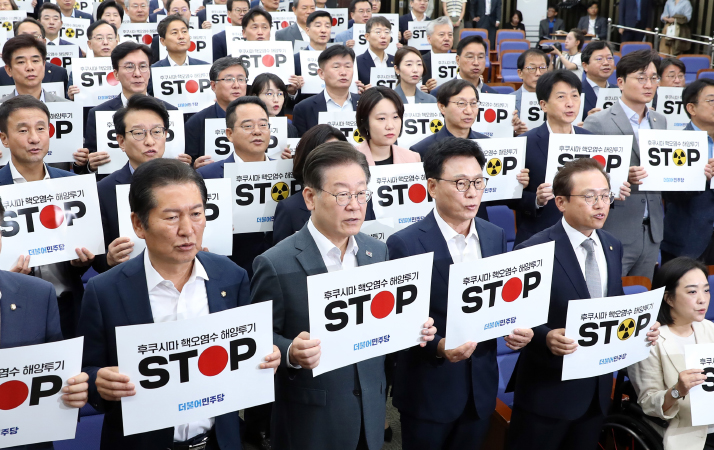| Voice |
| Fukushima Fiasco: More questions than answers | |
|
|
 Lee Jae-myung (front, second left), Chairman of the Republic of Korea's (ROK) main opposition Democratic Party, and parliament members protest against Japan's decision to release nuclear-contaminated wastewater in Seoul, the ROK, on August 24 (XINHUA)
The standoff between Japan and countries concerned about the release of nuclear-contaminated water from the damaged Fukushima nuclear power plant now resembles a game of table tennis. Of course, the results of a table tennis match are not likely to affect global health. But when water containing a radioactive substance that cannot be destroyed is flushed into the Pacific Ocean (and might be for the next three decades to come), major health issues might ensue. In 2011, the most powerful earthquake ever recorded in Japan triggered a massive tsunami that destroyed the Fukushima plant's cooling systems, causing three reactors to melt and contaminating their cooling water, which has been leaking ever since. The water has been collected, filtered, and stored in approximately 1,000 tanks, which will reach capacity in early 2024. So, what's the plan? It all seems so simple: Slowly drain the large tanks that house roughly 1 million metric tons of contaminated water into the massive Pacific Ocean, which presumably can swallow up the bad water before any of it can do any harm. Japanese officials insist the idea will work and be safe, pointing to the International Atomic Energy Agency's (IAEA) endorsement of the system. But of course, such a plan can never be simple. In fact, it could turn out to be incredibly dangerous. The concern is that all that water contains tritium, a radioactive isotope of hydrogen. What can tritium do to the body? According to the Canadian Nuclear Commission, "It can increase the risk of cancer if consumed in extremely large quantities. Tritium can enter the body through inhalation, ingestion or absorption through the skin." But slowly releasing it into the ocean should be fine, right? No one should worry, right? People should worry, which also explains why this potentially reckless plan has been so loudly protested throughout the world. The scientific community agrees that the ingestion of tritium at low levels should cause no bodily damage. But, as one leading American scientist told the BBC, "The challenge with radionuclides (such as tritium) is that they present a question that science cannot fully answer; that is, at very low levels of exposure, what can be counted as 'safe?' One can have a lot of faith in the IAEA's work while still recognizing that compliance with standards does not mean there are 'zero' environmental or human consequences attributed to the decision." "What can be counted as safe?" These words explain why voices of protest are being heard inside and outside Japan, with some of Japan's closest neighbors being the most upset. One such protest took place on September 2-3 in Seoul, capital of the Republic of Korea, where environmental organizations demanded all possible hazards be eliminated before any more water is released. Another protest took place outside the Japanese Prime Minister's residence in Tokyo. Another one took place in the Philippines. Protesters were all saying the same thing: "You cannot guarantee our safety. Stop releasing the nuclear-contaminated water. Now." And Japanese fishers are worried about their economic livelihood because the release of nuclear water will damage the reputation of Japan's seafood products, with one Japanese fisherman bluntly stating that "catch from the area won't sell." Perhaps one major reason why Japanese officials insist on executing their original plans is because the United States remains a steadfast supporter of the water release plan. Of course, when one recognizes that Fukushima is more than 8,000 km from San Francisco, a major American west coast city, it is rather easy for U.S. officials to give a thumbs-up to what is taking place. Bear in mind that whatever the health effects of this controversial plan may be, they will not be seen in America. Rather, the health toll, the economic toll and the social toll will be borne by the host of nations up and down East Asia. The author is an associate professor at the School of Informatics, Humanities and Social Sciences at Robert Morris University, the United States Copyedited by Elsbeth van Paridon Comments to liwenhan@cicgamericas.com |
|
||||||||||||||||||||||||||||||
|
